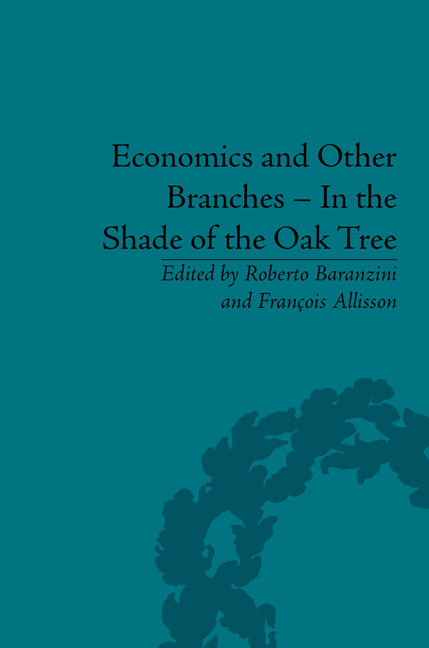Book contents
- Frontmatter
- CONTENTS
- List of Contributors
- List of Figures and Tables
- Introduction
- Pascal Bridel's Bibliography (up to 2013)
- Part I Léon Walras's Economic Thought
- Part II The Spreading of Thought
- Léon Walras's Reception
- The Lausanne School
- French Matters
- 9 Administration and Œconomic Government in Quesnay's Political Economy
- 10 Constant as a Reader of Sismondi
- 11 French Liberal Economists and the ‘Labour Question’ before and during the Revolution of 1848
- Cambridge UK
- Part III Monetary Theory
- Part IV Methodology
- Part V Economics and Humanities
- Economics and Social Sciences
- Some Insights from Visual Arts
- Part VI Economics and Civil Society
- Notes
- Index
10 - Constant as a Reader of Sismondi
from French Matters
- Frontmatter
- CONTENTS
- List of Contributors
- List of Figures and Tables
- Introduction
- Pascal Bridel's Bibliography (up to 2013)
- Part I Léon Walras's Economic Thought
- Part II The Spreading of Thought
- Léon Walras's Reception
- The Lausanne School
- French Matters
- 9 Administration and Œconomic Government in Quesnay's Political Economy
- 10 Constant as a Reader of Sismondi
- 11 French Liberal Economists and the ‘Labour Question’ before and during the Revolution of 1848
- Cambridge UK
- Part III Monetary Theory
- Part IV Methodology
- Part V Economics and Humanities
- Economics and Social Sciences
- Some Insights from Visual Arts
- Part VI Economics and Civil Society
- Notes
- Index
Summary
I
Coppet's group – a ‘cercle’, as defined by Simone Balayé that ‘ses membres n'ont à aucun moment tenté de baptiser’ – is an expression of informal sociability, cultural and intellectual interchange represents perhaps the only appropriate key to define it: ‘un point de passage ou de cesure’, as has been recently described, ‘entre l'Europe du Midi et l'Europe du Nord, entre latinité et germanité, mais aussi entre les régimes des princes et les structures républicaines (patriciennes ou populaires)’. Coppet's circle was not merely an academic or intellectual parlour, but for contemporary observers as well as for posterity it was an extraordinary vehicle for new ideas at an aesthetic, political and philosophical level. However, due to its informality, the group left only a few traces of the intense dialogue that took place among its protagonists.
In relation to the genesis of Benjamin Constant's two most important theoretical essays, Principes de politique and Fragments d'un ouvrage abandonné sur la possibilité d'une constitution républicain dans un grand pays, both written between 1800 and 1810 (a decade of intellectual splendour for Coppet's circle), and unpublished until the last century, it is relevant to recall the influence of the reading of Des circonstances actuelles qui peuvent terminer la révolution et des principes qui doivent fonder la République en France written by Mad. de Staël in 1798, which also remained a manuscript until its publication in 1906.
- Type
- Chapter
- Information
- Economics and Other Branches – In the Shade of the Oak TreeEssays in Honour of Pascal Bridel, pp. 135 - 146Publisher: Pickering & ChattoFirst published in: 2014

